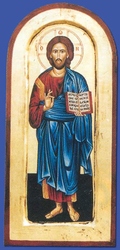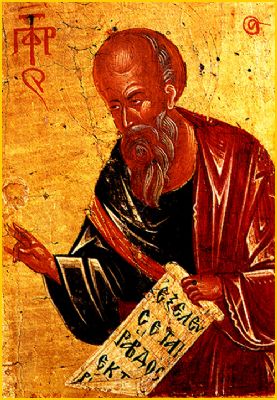|
|||
|---|---|---|---|
| This weekly bulletin insert complements the curriculum published by the Department of Christian Education of the Orthodox Church in America. This and many other Christian Education resources are available at http://dce.oca.org. | |||

We read the account of Jesus preaching in His hometown, at the synagogue in Nazareth (Luke 4:16-30.) Things start off well enough. Jesus reads from the prophecy of Isaiah in which the prophet tells of the One who has the Spirit of the Lord upon Him and who will bring good news, recovery and release to the poor, the captives, the blind and the oppressed. He tells the people, "Today this scripture has been fulfilled in your hearing" and in this way applies the prophetic words to Himself. The people speak well of Him and are amazed at His gracious words. But there is already a note of discord. The people ask each other, "Is not this Joseph's son?" as if they resent His assuming authority and knowledge when He is, after all, just one of them, the son of a simple carpenter. Jesus knows what they are thinking, and puts their thoughts into words: "No doubt you will quote to me this proverb, 'Physician, heal yourself.' And you will say, 'Do here also in your hometown the things that we have heard you did at Capernaum.' " He does not accept their opinion that He should perhaps have done some of His miracles in the place where He grew up. In fact, He brushes aside the idea by asserting that "no prophet is accepted in his own country." Then He says things that continue to raise the resentment of those who are listening. He first relates a story about the prophet Elijah, who was sent by God to help a widow during a famine. Just hearing that the woman lived "at Zarephath in Sidon" would alert His listeners that she was a Syrophoenician, not a Jew. Jesus makes the point even more strongly by saying that though there were many widows in Israel at that time, Elijah was sent only to this non-Jewish one. His next statement sends everyone into a rage. He again refers to an Old Testament prophet: Elisha this time, the disciple of Elijah. He reminds His listeners that Elisha cleansed a leper, Naaman the Syrian. He adds that there were "many lepers in Israel" when Elisha lived, just as there had been many widows in Elijah's time. But in each case the prophet ministered only to a non-Jewish person. 
Those in the synagogue get the point: God doesn't play favorites, and His salvation is open not only to them, the chosen people, but to everyone. This makes them so furious that they try to kill Jesus then and there. But with His majestic authority He passes through the midst of them and goes on His way. What would it have been like to be present in the synagogue that day? Would we be angered at the idea that we had no "exclusive" claim to God's attention and care? Or would we rejoice to have a God who reaches out to everyone? These are still questions worth thinking about. |
|||
